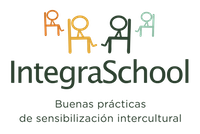IntegraSchool
Best practices for intercultural awareness.
Through this project, the Fundació Agricultors Solidaris has set itself the target of identifying, disseminating and promoting best practices in intercultural awareness projects in schools, which include a range of methodologies worked on in programmes that are jointly funded by the Asylum, Migration and Integration Fund of the Spanish Ministry of Employment and Social Security, as part of the programmes to promote interculturality and facilitate acceptance of diversity in society, especially in schools.
Experiences and projects in previous editions are analysed, the projects most closely in tune with the objectives are selected and the organisations involved are contacted, so that they can share their experiences and activities through this website, to share best practices and disseminate them among the educational community to improve results in future intercultural awareness projects.
Who is the project addressed to?
To social organizations, schools, teachers, community workers, social workers and other educational staff who want to learn about and make use of methodologies that promote multiculturalism and acceptance of diversity.
Background of the integraschool project
The Fundació Agricultors Solidaris has since 2001 been developing socio-occupational inclusion projects and carrying out a programme in social responsibility awareness and training in the workplace aimed at agricultural employers (responsible hiring, diversity management, occupational hazards, balancing work and private life, managing human resources by competence). It has also developed migration awareness projects in rural schools, with workshops based on life stories, multicultural games, storytelling and murals, projects valued both by the organisations and by volunteers, community workers and immigrants, as well as multidisciplinary projects that provide the chance to exchange experiences, knowledge and values of other cultures and traditions in school classrooms.
Aims
To promote best practices in raising awareness in schools of the facts of migration, with the participation of all the agents involved: the educational community and public and private social organisations.
To disseminate best practices in the educational community with the aim of improving the results of future intercultural awareness projects.
To study and systematise best practices used in the framework of the programmes jointly funded by the Asylum, Migration and Integration Fund.
To select best practices used and contact with the organisations involved.
To develop, design and implement a website for sharing best practices.
To draw up a list of best practices to help identify ten principles to be considered basic in carrying out intercultural awareness projects in schools.
To disseminate best practices in the educational community with the aim of improving the results of future intercultural awareness projects.
Promote the involvement of university students in the dissemination of intercultural awareness projects.

What is good practice in the educational environment?
Good practice is an action that guides us how to do a good job using methodologies and experiences already made that have achieved remarkable goals.
According to the Ministry of Education, Culture and Sport, in education, good practice is an initiative, policy or model of successful action that improves school processes and the educational results of the students. The innovative character of a good practice is completed with its effectiveness. In this context, educational innovation goes far beyond the mere production of novelty; must demonstrate its effectiveness and replicability. Only in these conditions a practice becomes a “good practice”, that is, in the valid expression of a professional knowledge, formulated in a way that is transferable and, therefore, useful for the corresponding community.
Ten best practices
This project promotes the compilation of intercultural awareness projects in different spheres. Below are the ten basic principles for carrying out intercultural projects in schools.
1. Integration
Awareness as two-way integration
2. Inclusive
Inclusive education
3. Cultural and religious diversity
The point of departure is recognition of cultural and religious diversity and the opportunities’ diversity has to offer
4. Sustainability
They must design viable long-term solutions
5. Replicable
It must be possible to replicate projects in schools of different types or in different areas
6. Adaptability
Projects must also be versatile, so that they can be adapted to different ages and types
7. Reflection
Perform activities that lead to reflection on social inequalities
8. Gender
They must promote equality in gender relations.
9. Involvement
Involvement of different professions
10. Effectiveness assessed
Innovative and effectiveness assessed by aims and results
What are intercultural awareness projects? What objective do they have?
The objective of intercultural awareness is to make the population aware of social inequalities, and offer people critical awareness of social problems, and commit to work for the transformation of our society, to gradually make possible the ideal of an intercultural citizenship.

